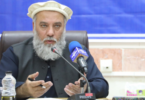KABUL (Pajhwok): The UN’s top diplomat in Afghanistan has reiterated her call for the caretaker government to reverse the restrictions imposed on women and girls.
The longer the curbs remained in place, the more damage they would result in, warned Roza Otunbayeva, special representative of the secretary-general (SRSG).
Briefing the UN Security Council on Wednesday, she slammed recent arrests of Afghan women for alleged Islamic dress code violations.
“The denial of women’s and girls’ access to education and work and their removal from many aspects of public life has caused immense harm to mental and physical health, and livelihoods,” she commented.
Otunbayeva recalled the second meeting of national and regional special envoys for Afghanistan, held in Doha on February 18 and 19.
Although the interim government stayed away from the meeting, it welcomed the secretary-general’s statement on the need for deeper consultations, the UN envoy said.
In a statement from the UN, Otunbayeva voiced concerns over “numerous negative trends” witnessed recently in Afghanistan.
She claimed UNAMA’s monitoring and advocacy, including on human rights, had highlighted the denial of the civil, cultural, economic, political and social rights of the population.
The UNAMA chief criticised public displays of violence, including corporal and capital punishment, a lack of inclusive governance and the marginalisation of minorities.
“It is true that day-to-day security has improved for millions of people since the Taliban takeover, but this has come at an enormous cost,” she observed.
Afghanistan remains a persistent challenge for the global fraternity, according to the diplomat, who referred to instability, terrorism and opium production in Afghanistan.
Otunbayeva acknowledged the current state of relative stability and commended efforts by the current government in cracking down on opium cultivation and battling Daesh.
“But if the other issues I have mentioned are not addressed, these achievements will not be enough to assure long-term sustainability,” she cautioned.
Following the political change in October 2021, the UN envoy said:
Donors have provided nearly 8 billion dollars in funding for humanitarian needs and basic human services, ensuring vital assistance to 32 million Afghans so that they have sufficient food and water, adequate shelter, and income opportunities.
Donors have also responded to specific emergencies such as the earthquakes in Paktika in 2022, and in Herat in 2023 which directly impacted hundreds of thousands of people.
More than 500,000 Afghans repatriated from Pakistan were helped to restart their lives, with the international community supporting an effective response strategy put in place by the de facto authorities.
The international community has enabled the continuation of most primary medical care. Since May 2022 collective donor support through the World Bank has enabled 7.5 million people to receive health and nutrition services.
Regular UN cash shipments to support these vital humanitarian operations have continued. These shipments have, as a secondary effect, injected liquidity to the local economy that has in large part allowed the private sector to continue to function and averted a fiscal crisis. Support for printing and shipping banknotes has also helped with liquidity and supported the Afghani currency.
The Security Council adopted in December 2021 Resolution 2615 – the ‘humanitarian exception’ – in which it decided that ‘humanitarian assistance and other activities that support basic human needs in Afghanistan’ are not a violation of the financial sanctions set out in the 1988 sanctions regime. This decision has enabled everything that I have described so far to take place.
A number of countries have retained their diplomatic presences in Kabul, engaging regularly with the de facto authorities especially on economic issues, enhancing trade and investment.
The World Bank board on the 15 February approved an adjusted approach to Afghanistan that unlocks more funding for basic needs and restarts an important regional electricity supply project.
We will maintain our engagement with the de facto authorities on respect for human rights and ways to increase consultations with local populations, as well as their participation in political decision-making, so that all of Afghanistan’s available resources can be deployed for its own well-being.
We will encourage donors to identify areas where they can provide longer-term sustainable assistance that directly benefits the Afghan people. These include measures to reduce the effects of climate change, to reduce the effects of the opium ban, and to support the ongoing demining of Afghanistan in cooperation with the de facto authorities.
We will advocate for support for more funding to be directed towards basic human needs to build more social and economic resilience. Assistance in basic services is a lifeline for the most vulnerable Afghans with the majority of the beneficiaries constituting women.
We will promote measures to support economic stabilization as a foundation for poverty reduction, which will not be possible without the right enabling environment in the financial sector. Banking and microfinance are only two of the concrete areas that we need to strengthen.
We will commence preparations for the next meeting in the Doha format. The next meeting should have a practical agenda and should involve the participation of the de facto authorities as well as other Afghan stakeholders.







